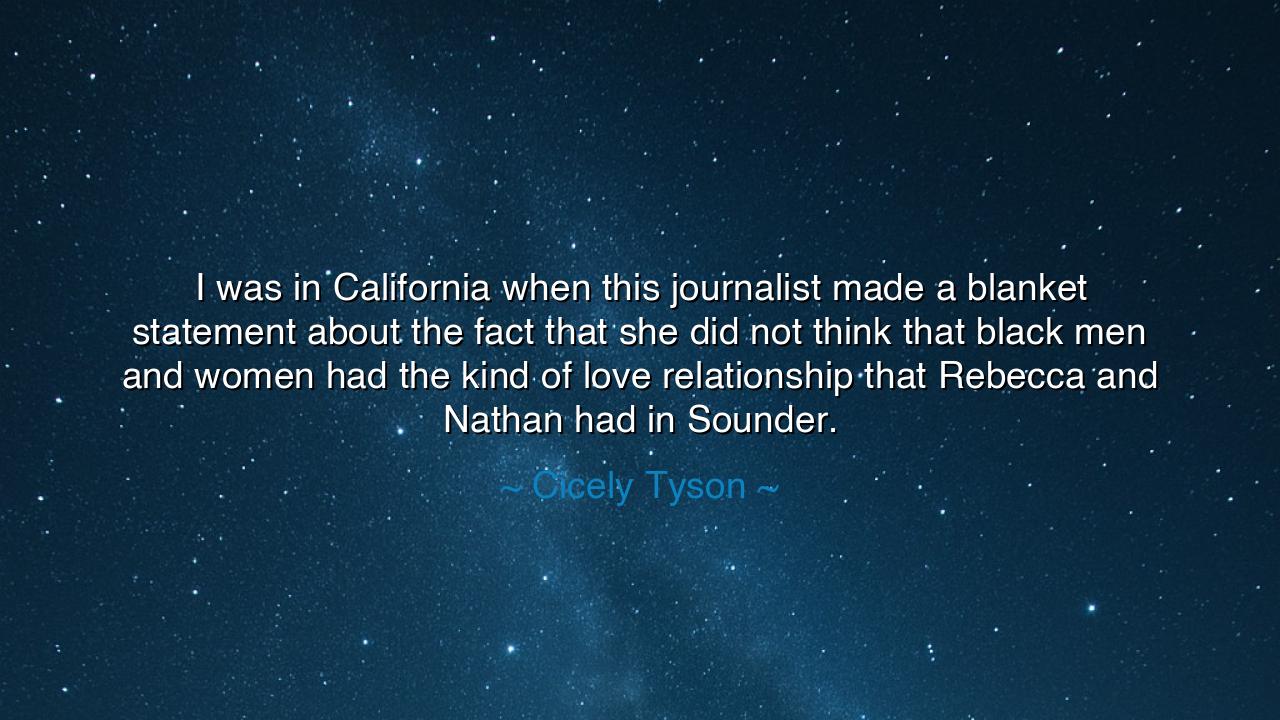
I was in California when this journalist made a blanket
I was in California when this journalist made a blanket statement about the fact that she did not think that black men and women had the kind of love relationship that Rebecca and Nathan had in Sounder.






The words of Cicely Tyson—“I was in California when this journalist made a blanket statement about the fact that she did not think that black men and women had the kind of love relationship that Rebecca and Nathan had in Sounder”—burn with the pain of dismissal, yet shine with the defiance of truth. They remind us that prejudice not only distorts justice, but also dares to deny the very humanity of love itself.
The ancients knew that to question a people’s capacity for love was to wound them at the root of their dignity. For love is the most universal of bonds, transcending blood, tribe, and nation. Tyson recounts how a careless journalist, steeped in bias, dared to declare that such a deep relationship could not exist between black men and women. In this moment, ignorance revealed itself not as strength, but as blindness, unable to see what was eternal and true.
The love of Rebecca and Nathan in Sounder was not merely a tale—it was a mirror, reflecting what was always there, though the world chose not to look. Their bond represented loyalty, sacrifice, and endurance amidst hardship. Tyson’s words stand as a rebuke to all who deny such love, reminding us that it is not race or circumstance that defines the capacity for devotion, but the human heart itself.
This truth is heroic, for it reclaims what prejudice tries to steal. To affirm the depth of black love, of any love, in the face of denial, is to rise against centuries of silencing. It is to declare that affection, respect, and sacred union are not privileges of the few but the inheritance of all. Tyson, in speaking of this wound, transforms it into a torch of truth, carried forward for future generations.
So let this teaching endure: beware the voices that seek to define others by limitation, for they speak from shadows. Love is the most ancient power, belonging to every people, every time, every place. To deny it is folly, to diminish it is injustice, but to affirm it is to stand with the eternal. For as Rebecca and Nathan showed, and as Tyson reminds us, love shines brightest when the world insists it cannot exist.






GDGold D.dragon
Cicely Tyson’s response to the journalist’s comment about black love being different than what we see in *Sounder* really hits home. It makes me wonder how much of what we think about love is shaped by societal expectations and media portrayals. How often do we fail to recognize that love transcends race and is shaped by individual experiences, not predetermined stereotypes?
AKAn Khanh
Cicely Tyson’s words bring to light the importance of breaking down stereotypes. The idea that black men and women can’t share the same kind of love depicted in *Sounder* feels incredibly limiting and dismissive. How do we ensure that love—especially between black couples—gets the recognition it deserves in all its depth and complexity? What role do the media and representation play in shifting these views?
Hhlam
Cicely Tyson’s reflection on the journalist’s statement highlights a deeper issue about perception and representation. Why is it that some people seem to have such narrow views on relationships, especially within black communities? It’s as if they’ve never seen or understood the rich, multifaceted love that exists in those relationships. How can we work to expand the lens through which we view love in different communities?
GMnguyen gia minh
Reading Cicely Tyson’s perspective on that journalist’s statement, I’m struck by the harmful nature of generalized assumptions. Love is such a universal experience, so why do some people try to pigeonhole it based on race? Could it be that this stems from a lack of representation in mainstream media, like in *Sounder*? How do we change the narrative to showcase more diverse expressions of love?
TTHien Tran Thu
Cicely Tyson’s experience with the journalist’s comment is eye-opening. It’s unsettling to hear that someone could dismiss the depth of love in black relationships. This makes me wonder: why is it that people often separate love based on race or culture? How do we break through those barriers and challenge assumptions about who can love whom and how?